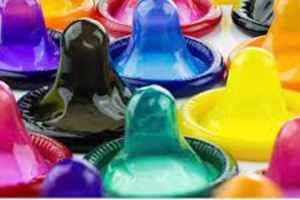
Supplies have run dry at hospitals and drop-in centres where sex workers and the general public access condoms for free.
A shortage of condoms threatens to undermine the campaign against sexually transmitted infections (STIS) and family planning programmes in Kenya.
The nationwide condom shortage puts the health, safety and livelihood of thousands of commercial sex workers at grave risk.
As a key tool in preventing STIs, including HIV/Aids, and unintended pregnancies, the scarcity has made many to have unprotected intercourse or reuse condoms.
Supplies have run dry at hospitals and drop-in centres where sex workers and the general public access condoms for free.
In the streets of Nairobi, Mombasa, Kisumu, Nakuru, Eldoret and other towns, sex workers now negotiate with clients, some of who refuses to use protection, increasing their risk of contracting HIV, gonorrhea, syphilis and other STIs.
The shortage has also fuelled condom reuse and sharing, practices that heighten the risk of infections.
In an interview with the Daily Nation, National Aids and STI Control Programme (Nascop) head Andrew Mulwa admitted that the country faces a condom shortage.
“The price of rubber rose, so condom makers have been having challenges,” Dr Mulwa said.
“But Kenyans should not be worried as the country recently procured 93 million condoms that should be here by the end of the month. It is a difficult time but we are doing all we can to make them available.”
According to the National Syndemic Diseases Council (NSDCC), Kenya has an annual condom demand of 400 million pieces, with the government distributing about 200 million.
The country’s condom programme is also heavily donor-funded, requiring Sh1.118 billion, with a resource gap of Sh803, 24 million or 71.9 per cent.
Doctors and other health experts now say the condom crisis could trigger a sharp rise in HIV infections.
The sex workers are also not able to access pre-exposure prophylaxis (PrEP) – a daily pill that helps prevent HIV infection in people that was being given to them for free.
This comes after the United States Agency for International Development (USAID) stopped funding condom programmes due to President Donald Trump’s “stop-work” for foreign assistance.
Ms Peninnah Mwangi, the director of Bar Hostess Empowerment and Support Programme – an organisation that works with bar waitresses and vulnerable women – said she supplied 100,000 condoms in Nairobi alone daily before the USAID shutdown.
“Some of our members are now washing and re-using condoms. Nairobi has 200,000 sex workers who rely on the condoms we give them, according to our database” she said.
“Men who go to seek their services usually have no condoms and are not willing to buy.”
Ms Mwangi added that because most sex workers are poor, they are torn between buying condoms whose prices have now gone up and buying food, paying school fees for their children or settling house rent.
“Our organisation started in 1998 when HIV/Aids was declared a national disaster. Even before that, we had noted that women in the sex industry and bars were affected more than the general population. We had to come together to form an organisation to support them,” she said.
At the time, women were dying in large numbers while survivors grappled with HIV stigma. There were no antiretrovirals (ARVs) then.
“Since Trump’s stop work order, we have had to shut two clinics that used to serve thousands of sex workers in Nairobi,” she said.
Years ago, the organisation mapped out Nairobi and identified “hotspots” – places frequented by sex workers – distributing condoms and PrEP.
The areas were mostly in the northern and eastern parts of the capital city, including Dandora, Kasarani, Kariobangi and Mathare.
“We have peer educators who also distribute condoms and PrEP to the hotspots. Every peer worker gets Sh6,000 to Sh10,000 a month. The money has been coming from USAID,” she said.
A sex worker identified as Elizabeth told the Daily Nation that she got into the trade following the death of her police officer husband eight years ago. Elizabeth and her husband had two sons.
“Having dropped out of high school for lack of fees, I got married almost immediately. It did not end well,” said Elizabeth, who operates in Thika and Nairobi City Centre.
“It’s true that many of us reuse condoms. We even get some from dustbins and wash them with soap.”
Condom prices have gone up in the last three years, with a pack of three that used to cost Sh150 now selling for Sh600.
“Why would I spend Sh600 on condoms every time I have a customer who pays Sh500?” Elizabeth asked.
Nodding in agreement was Agrippina, a 27-year-old who joined the sex industry in Thika, Kiambu County, recently.
“A man will not want to part with Sh600 on top of the service we offer. Some even want to settle for less than Sh500,” Aoko said.
“They don’t want to buy condoms or show up with them despite knowing the importance of safe sex.”
Agrippina also admits to washing condoms and reusing them.
“I have had four condoms since January. I air them on a line with pegs to dry after washing them. They are used whenever a client shows up,” she said.
“I used to get free condoms from one of the hotspots but we have been told USAID no longer sends them and the PrEP, which is important. Condoms at times burst.”
A recent presentation at a health conference in Mombasa titled “The National Condom Situation” by NSDCC Chief Executive Ruth Laboin-Masha showed that correct and consistent condom use provides up to 95 per cent protection against HIV, other STIs and unintended pregnancy.
“More than 190 million male condoms were distributed in Kenya in 2021, against a requirement of 424 million. Some three million female condoms were distributed against a need of eight million in the same period,” Dr Laboin-Masha said.
In an interview with the Daily Nation yesterday, Dr Laboin-Masha admitted that several USAID-funded clinics that supply condoms and PrEP closed shop.
“We ask those who have been accessing clinics and hotspots that have been shut to go to county hospitals. I am in Nakuru meeting county health bosses over the same,” she said by phone.
NSDCC says there are 17,854 condom distribution points in Kenya, out of which 84 per cent are bars.







